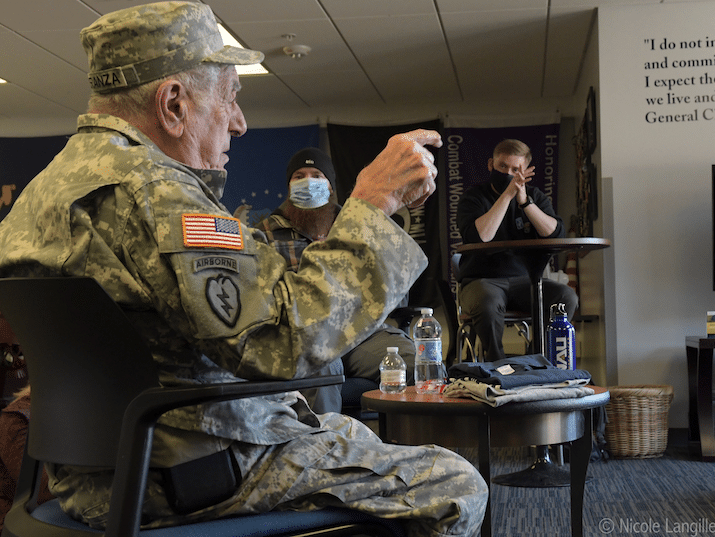With crisply starched fatigues, World War II veteran and 101st Airborne Division patches fixed on his uniform, paratrooper boots glistening, Private First Class (PFC) Vince Speranza marvels at the thrilling twist his life took in his mid-80s.
Now 95, the veteran, retired history teacher, widower, father and grandfather, has a popular book called Nuts!: A 101st Airborne Division Machine Gunner at Bastogne that he published at the age of 89. He has more friends on Facebook than he knows what to do with, and fame in Belgium that rivals Jean-Claude Van Damme’s.
The freshly vaccinated American WWII GI and Illinois resident is visiting NAU this week to share his story with military-connected students, staff and Army ROTC cadets. He spoke about his Indie Book Award Finalist tome “Nuts,” shared life advice and talked about his discovery a few years back that his actions during the war were famous in Belgium. In fact, a dark Belgian brew called Airborne Beer was created to commemorate them.
During his service, Speranza earned a Purple Heart, a Bronze Star and a Presidential Unit Citation. But those recognitions where not what brought him fame. It was the Battle of the Bulge, one of the deadliest and coldest battles of WWII. Speranza recalls coming across a buddy laying on a church basement floor, legs covered in shrapnel. His buddy asked him for something to drink and off he went to find something, stumbling across a bombed-out tavern. When he pulled the tap, to his dismay, fresh beer poured out. Not finding a glass to pour it, he took off his helmet, filled it up and dashed back to the church where other injured GIs excitedly asked him to share. As he went back for refills, the regimental commander caught and reprimanded him, warning his good deed could harm his injured friends.
Unbeknownst to Speranza, back in the states after his military service, the story took off in Belgium, becoming a legendary tale, with a local Belgian tavern creating a beer with Speranza’s image on the label, helmet in hand, beer sloshing around. At the tavern, the beer is served in helmet-shaped bowls.
“For 65 years I had nothing to do with the military. I’m ashamed of it now. I wouldn’t even watch the movies,” Speranza said, recounting leaving Fort Dix at the end of WWII, locking his experiences in a box and becoming a teacher, a husband, father and grandfather—roles he cherished and loved.
“All of a sudden, I’m 85 years old, an old man, waiting to die,” he said about how he felt after retiring and losing his wife of 70 years to Alzheimer’s.
One fateful day, while in a shop in Florida, a woman with a Belgian accent struck up a conversation and he disclosed he had fought in Bastogne.
“You have not been back?” she asked. “You must. The people of Bastogne have never forgotten the 101st Airborne Division. The men and women put on uniforms and reenact the battle. You must go back. They’ll want to honor you.”
As the lady in the shop predicted, his visit to Bastogne was met with celebration. The rarity of coming across a WWII veteran who fought there! A historian had even made a sketch of the location of foxholes and took him to the one where he had burrowed with his machine gun 70 years earlier. During a round of storytelling, he innocently recounted his helmet beer story to a stunned group of listeners, who summoned him to a bar where Airborne Beer was served.
“After being a machine gunner at the Battle of the Bulge, winning a Purple Heart and a Bronze Star and two decades as a public-school teacher, Airborne Beer is what I’m famous for!” he chuckled.
His life has completely changed. “Enter my name on Google! You’ll read all about me!”
He now travels the world, talks about and autographs his book, which details living in New York City in the early 1930s. He says it still shocks him how people have reacted, and who he’s gotten to rub elbows with at his advanced age.
“Me! A PFC!” he exclaims about visiting the Pentagon. “I’ve met the Secretary of the Army, the Chief of Staff, the Assistant Chief of staff, down to the Command Sergeant Major. They all want to hear the beer story.” He was even offered an Aide de Camp (VIP military escort) on his next trip to Bastogne for the next years’ commemorations. “An Aide de Camp! To a PFC!”
Why does he think his story has had the reaction it did? It’s a good story he admits, but his book, which talks about his childhood in New York City, the child of Italian immigrants, has intrigued many.
“It was a different time, it was the Great Depression, a story of immigrants,” he said. “The whole first part of the book is about the wave of Italian and Irish immigrants who left their countries to improve themselves.”
At NAU, he relished the opportunity to interact with students and staff. What advice does he have for students?
“Pay attention to your training,” he said. “In Bastogne, there were 12,000 American troops next to 56,000 German troops. The Americans had 73 tanks. The Germans had over 1,000. Our food was rationed. We didn’t have what we were supposed to have. But when you are well trained, your brain tells you what to do. When you train and train hard, you have already proven to yourself what you are capable of. That kind of training makes all the difference in the world.”

Margarita.Bauza@nau.edu



